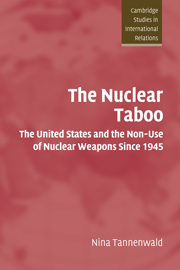Book contents
- Frontmatter
- Contents
- Preface
- List of abbreviations
- 1 Introduction: the tradition of nuclear non-use
- 2 Explaining non-use
- 3 Hiroshima and the origins of the nuclear taboo
- 4 The Korean War: the emerging taboo
- 5 The rise of the nuclear taboo, 1953–1960
- 6 Nuclear weapons and the Vietnam War
- 7 Institutionalizing the taboo, 1960–1989
- 8 The 1991 Gulf War
- 9 The taboo in the post-Cold War world
- 10 Conclusion: the prospects for the nuclear taboo
- Select bibliography
- Index
- CAMBRIDGE STUDIES IN INTERNATIONAL RELATIONS
3 - Hiroshima and the origins of the nuclear taboo
Published online by Cambridge University Press: 22 September 2009
- Frontmatter
- Contents
- Preface
- List of abbreviations
- 1 Introduction: the tradition of nuclear non-use
- 2 Explaining non-use
- 3 Hiroshima and the origins of the nuclear taboo
- 4 The Korean War: the emerging taboo
- 5 The rise of the nuclear taboo, 1953–1960
- 6 Nuclear weapons and the Vietnam War
- 7 Institutionalizing the taboo, 1960–1989
- 8 The 1991 Gulf War
- 9 The taboo in the post-Cold War world
- 10 Conclusion: the prospects for the nuclear taboo
- Select bibliography
- Index
- CAMBRIDGE STUDIES IN INTERNATIONAL RELATIONS
Summary
If the United States were to lose a war because of the failure to use the bomb for humanitarian reasons, we should be guilty of the greatest disservice to civilization in the history of mankind.
Secretary of the Air Force Stuart Symington, June 9, 1948, during the Berlin crisis.On August 6 and 9, 1945, the United States dropped two atomic bombs on Japan, ending World War II and inaugurating the nuclear age. This chapter examines the US decision to use atomic weapons on Japan and the origins of a nuclear taboo in the period up to 1950. In 1945, the atomic bomb was widely accepted as a legitimate weapon of war. Most politicians and generals regarded it as completely natural to use the atomic weapons they had at hand to end the war against Japan as speedily as possible. Yet by the time of the Korean War, five years later, significant inhibitions on the use of atomic weapons were already evident, and these cannot be accounted for by deterrence.
The origins of the taboo lay especially in a set of policy precedents and categories established by President Truman and the United Nations which marked out nuclear weapons as different from other weapons. These efforts were propelled by fears of the destructive power of the new weapon, the shock and horror of the Japan bombings, and the moral qualms of key leaders, especially Truman.
- Type
- Chapter
- Information
- The Nuclear TabooThe United States and the Non-Use of Nuclear Weapons Since 1945, pp. 73 - 114Publisher: Cambridge University PressPrint publication year: 2007

